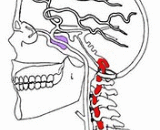Vertebrobasilar Insufficiency (VBI)
Vertebrobasilar insufficiency

Vertebrobasilar insufficiency (VBI) or vertebral-basilar ischemia, also called beauty parlour syndrome (BPS), is a temporary set of symptoms due to decreased blood flow in the posterior circulation of the brain. The posterior circulation supplies blood to the medulla, cerebellum, pons, midbrain, thalamus, and occipital cortex. Therefore, the symptoms due to VBI vary according to which portions of the brain experience significantly decreased blood flow. The incidence of VBI increases with age and typically occurs in the seventh or eighth decade of life. Reflecting atherosclerosis, which is the most common cause of VBI, it affects men twice as often as women and patients with hypertension, diabetes, smoking, and dyslipidemias have a higher risk of developing VBI.
Organism species: Mus musculus (Mouse)
- Disease model DSI692Mu01 Mouse Model for Vertebrobasilar Insufficiency (VBI) In Stock
- Customized Service n/a Tissue of Vertebrobasilar Insufficiency (VBI) (If Necessary) Tissue Customized Service Offer
- Customized Service n/a Serums of Vertebrobasilar Insufficiency (VBI) (If Necessary) Serums Customized Service Offer
Organism species: Rattus norvegicus (Rat)
- Disease model DSI692Ra01 Rat Model for Vertebrobasilar Insufficiency (VBI) In Stock
- Customized Service n/a Tissue of Vertebrobasilar Insufficiency (VBI) (If Necessary) Tissue Customized Service Offer
- Customized Service n/a Serums of Vertebrobasilar Insufficiency (VBI) (If Necessary) Serums Customized Service Offer
Organism species: Cavia (Guinea pig )
- Disease model DSI692Gu01 Cavia Model for Vertebrobasilar Insufficiency (VBI) In Stock
- Customized Service n/a Tissue of Vertebrobasilar Insufficiency (VBI) (If Necessary) Tissue Customized Service Offer
- Customized Service n/a Serums of Vertebrobasilar Insufficiency (VBI) (If Necessary) Serums Customized Service Offer
Organism species: Oryctolagus cuniculus (Rabbit)
- Disease model DSI692Rb01 Rabbit Model for Vertebrobasilar Insufficiency (VBI) In Stock
- Customized Service n/a Tissue of Vertebrobasilar Insufficiency (VBI) (If Necessary) Tissue Customized Service Offer
- Customized Service n/a Serums of Vertebrobasilar Insufficiency (VBI) (If Necessary) Serums Customized Service Offer
Organism species: Canis familiaris; Canine (Dog)
- Disease model DSI692Ca01 Canine Model for Vertebrobasilar Insufficiency (VBI) In Stock
- Customized Service n/a Tissue of Vertebrobasilar Insufficiency (VBI) (If Necessary) Tissue Customized Service Offer
- Customized Service n/a Serums of Vertebrobasilar Insufficiency (VBI) (If Necessary) Serums Customized Service Offer


